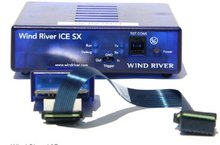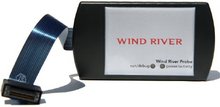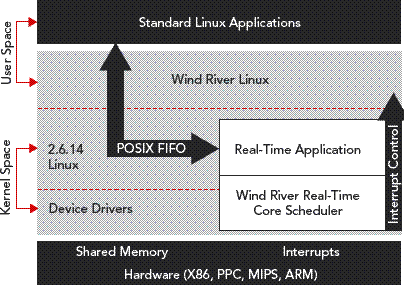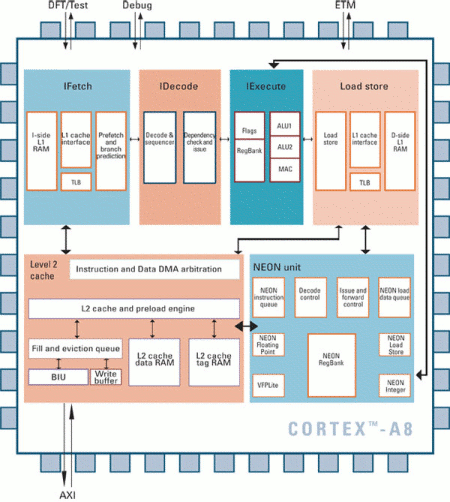Hardware assisted Linux dev tools rev’d
Dec 11, 2007 — by Eric Brown — from the LinuxDevices Archive — 36 views Wind River is readying an update to its hardware-assisted, Eclipse-based toolsuite for Linux and VxWorks. Workbench 3.0 On-Chip Debugging (OCD), due by year's end, adds support for half a dozen new mobile applications processors, and supports the “RTCore” real-time Linux add-on purchased from FSMLabs this… summer.
Wind River is readying an update to its hardware-assisted, Eclipse-based toolsuite for Linux and VxWorks. Workbench 3.0 On-Chip Debugging (OCD), due by year's end, adds support for half a dozen new mobile applications processors, and supports the “RTCore” real-time Linux add-on purchased from FSMLabs this… summer.
(Click for larger view of WorkBench OCD screenshot)
Last updated in April, Workbench OCD works in tandem with hardware debug tools, such as the company's “Wind River JTAG Probe” and “Wind River ICE” (in-circuit emulator), pictured below. The tools are said to support the debugging of Linux kernels and user-space applications without adding software “instrumentation.” Instead, the Eclipse-based software collaborates with the hardware tools to exploit the debugging interfaces built into modern microprocessors in order to step through applications, or view kernel and application context.


Wind River's ICE and Probe tools
(Click to enlarge either)
Wind River touts new features in Workbench 3.0 OCD that include:
- Mobile device processor support — The Workbench OCD now supports the ARM Cortex A8 processor with NEON instruction set; Freescale i.MX27; Marvell PXA 300/310/320 application processors; and TI's TMS320DM644x DaVinci family
- RTCore debugging — New support for debugging of applications running natively in the Wind River Linux Real-Time Core (RTCore) real-time environment (see diagram below) purchased from FSMLabs earlier this year
- New compiler support — Supports GNU tools and ARM RealView, as well as the Wind River Compiler
- Eclipse IDE updates — Workbench OCD 3.0 sources components from the upstream Eclipse Europa release, including : Eclipse 3.3, CDT (C/C++ development tooling) 4.0, Target Management 2.0, and Device Debugging 0.9. Wind River is also touting its improved compatibility and integration with open source Eclipse plug-ins, including Editor, Register/Memory Viewer, and Target Manager.

Wind River RTCore real-time Linux add-on
Additionally, as part of the 3.0 rev, Wind River upgraded Workbench OCD's JTAG Server and JTAG Accelerator technologies with improved GUI-based synchronization controls, which the company claims are especially useful for developing with multi-core processors. Multi-core is growing more common in the mobile arena, according to the company. JTAG Accelerator offers full JTAG bandwidth utilization while supporting complex 32- and 64-bit processors, and JTAG Server lets developers simultaneously connect to over 128 processors, debugging multiple processors at once and within a single instance of an IDE. Wind River also touts Workbench OCD's support for low-power architectures as a key benefit for mobile developers.

ARM'S Cortex A8 — one of four new processors supported by Workbench OCD
(Click to enlarge)
Sandy Orlando on debugging in a mobile environment
In an interview, Sandy Orlando, VP and GM of Workbench OCD, noted that the upgrades go hand in hand with the company's increasing focus on the mobile market and its support of emerging standards such as Open Handset Alliance (OHA) and the LiMo Foundation. “The growing complexity of mobile devices makes it more difficult for customers to develop their own tools and environments,” she said. “There's also a need to differentiate products in a complex, very competitive market, and there are pressures to get products more quickly to market. Time to market is more important than any other category because there's seasonality to deliver devices, and BOM (bill of materials) costs are also important.”
According to Orlando, Linux offers some challenges with complex, multi-core mobile applications, making efficient debugging tools all the more important. “Linux is becoming very important in developing mobile handsets, but the increasing complexity means that the hand-off between hardware development and software development needs to be tighter and more integrated, especially with developers working in different geographies,” she said. “Linux requires that you continually manage the bootloader, the kernel module stabilization, and application development, and that can be very iterative.”
Orlando also noted that JTAG debug tools are becoming much more prevalent than agent-based approaches in the mobile space. “Agent technology can give you more application visibility, but mobile-device developers don't want to add resources to debug functions, so they are increasingly moving to JTAG,” said Orlando. “Agent technology can consume CPU cycles and memory, all of which have cost implications, and in some environments, an IP stack or COM port may not be available. JTAG saves time by connecting into the target and pulling information off the processor by itself.”
Availability
The Wind River Workbench, On-Chip Debugging solution will be available this month under Wind River's Enterprise and Perpetual Licensing Business Models, says the company. Various bundle options are also available. More information is available here.
This article was originally published on LinuxDevices.com and has been donated to the open source community by QuinStreet Inc. Please visit LinuxToday.com for up-to-date news and articles about Linux and open source.